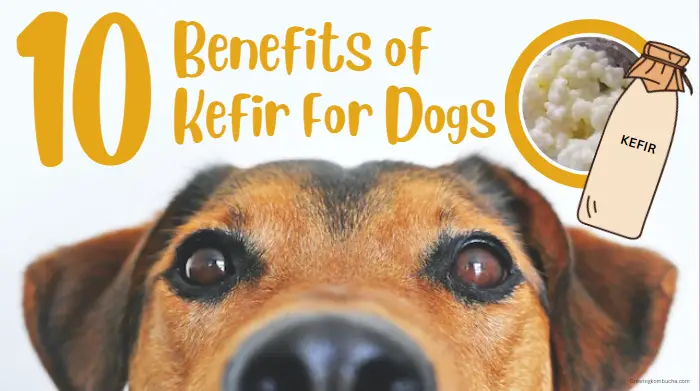Kefir is a fermented milk drink that’s good for both humans and dogs. It is made of simple ingredients that qualify the canine dietary needs without any side effects. Discover the health benefits of kefir for dogs and how it can act as a natural treat, a natural dewormer, and relief for their upset stomach.
Before we enumerate the goodness of kefir for dogs, It’s best to learn more about kefir, what’s in it, and why some people consider it a better option than your typical yogurt.
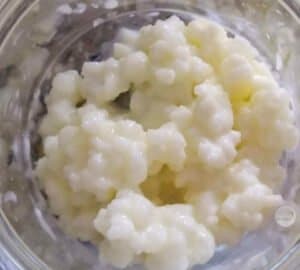
What is kefir and why is it healthy?
Kefir is fermented milk from the milk of goats, cows, and sheep where good bacteria and yeast solidify and develop into kefir grains. It is the ancient way of preserving milk that is believed to have started in the Caucasus mountains in Eastern Europe.
Many people are adding kefir to their diet because of its rich probiotics that contribute to good health. Here are some of its profound features that will make you want to add kefir to your healthy diet:
- Has right-turning strains of bacteria colonizing the gut.
- 30 to 56 unique strains of bacteria compared to 7 strains of bacteria in yogurt.
- Contains probiotics that stay in the body to fight disease-causing pathogens.
- Kefir probiotics are not fully killed by antibiotics.
The concentration of probiotics in kefir is the secret to its healthy nutrition. The fermentation process also enhances the vitamins in minerals in kefir that can satisfy the daily recommended nutrient intake of our body.
Is kefir safe for dogs?
According to the American Kennel Club, yogurt and kefir are two of the safest probiotics for dogs. However, you must be mindful of the extra chemicals and flavoring in commercially-available kefir and yogurt that can be harmful to your dog.
Aside from the green light from different animal welfare institutions, a small study from the University of Konkuk, South Korea also confirms that kefir has no detrimental effect on dogs. They concluded that kefir has no significant negative effect on the body weight and overall health of the dogs under observation.
Can kefir cause any side effects on dogs?
Kefir is inherently low in lactose. However, it may cause issues in dogs with lactose intolerance. Therefore experts from PetsMD advise pet owners to use coconut kefir instead. Issues with kefir only arise when dogs overdrink it. Excess kefir consumption can sometimes lead to:
- Bloating.
- Diarrhea.
- Runny stools.
- Mild stomach issues.
10 Benefits of kefir for dogs
If you’re still skeptical about giving kefir to your dogs, here are the health benefits of kefir milk for dogs that might finally convince you:
#1 Boosts the immune system

The probiotics in kefir help keep your furry pets in tip-top shape no matter how much they love biting or chewing anything that they fancy. The continuous influx of good bacteria keeps the balance in their gut that prevents them from getting sick and reinforces their body to fight canine diseases better.
#2 Acts as a natural dewormer

Worms are the worst enemies of puppies. As fur parents, we all know that the young immune system of puppies is not strong enough to fight off digestive worms. Therefore, rigorous deworming is required in the first few years of the pup’s life.
Introducing kefir to your pup’s diet not only helps boost its immune system but also prevents worms from overtalking its gut. It is not a replacement for purgative medicine but serves as good maintenance after a deworming session so your dog keeps a worm-free gut.
#3 Protect the gut and improve digestion

Almost any dog owners know that the quality of poop is the best indicator of the digestive health of their pets. Anything that’s too runny or wet in your dog’s stool means something is not doing well even if they are active and happy.
The good balance of bacteria in the gut is usually disrupted when your dog is:
- On antibiotics.
- Ate something from the trash.
- Has worms.
- Stressed.
- Has an infection.
- Suffering from food allergies.
- Too old.
Kefir is rich in Vitamin B12 that’s essential for optimal digestion. By adding kefir to your dog’s diet, you’ll be preventing any gut disturbances and helping it maintain a healthy stool quality.
A healthy gut microbiome contributes to overall health. Like humans, healthy dogs are more resistant to diseases and viruses which means you’ll be spending less on veterinary checkup costs too.
#4 Treats bad breath
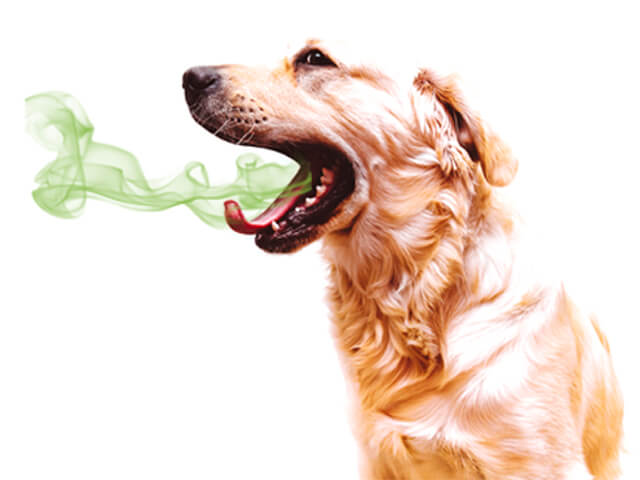
Bad breath is one of the annoying issues on our pets apart from their smelly ears. Good thing, kefir can help manage the bacterial growth in your dog’s mouth which eventually helps prevent bad breath. The probiotics also help treat gastrointestinal issues that can partly cause bad breath.
Thanks to kefir you can safely smooch your pets without being blasted with pungent air that can make you go oof!
#5 Nature’s antibiotic that contains anti-cancer properties

Pet advocate Rodney Habib is a huge advocate of kefir for dogs for its incredible contribution to their overall health. He also shares that it contains anti-cancer properties that keep dogs out of the deadly condition.
Veterinarians.org acknowledges the role of probiotics in cancer prevention and management. They reiterate that kefir is not a cure for cancer but helpful dietary support for dogs undergoing chemotherapy. It helps manage the symptoms and helps the dog’s body to recover from intense cancer treatments.
#6 Alleviates and prevents inflammatory problems like allergies

Allergy is not a disease but a defensive reaction of the body in humans and in dogs due to allergens and pathogens. It usually occurs when pathogens manage to slip through the intestines and enter the bloodstream, leading to inflammation.
Due to the concentration of probiotics in kefir, they can colonize or become dominant in the gut which kills off allergy-causing pathogens. Reinforcing good bacteria from kefir can help prevent pathogens from permeating through the intestinal walls and entering the bloodstream.
#7 Rich in biotin which is good for skin
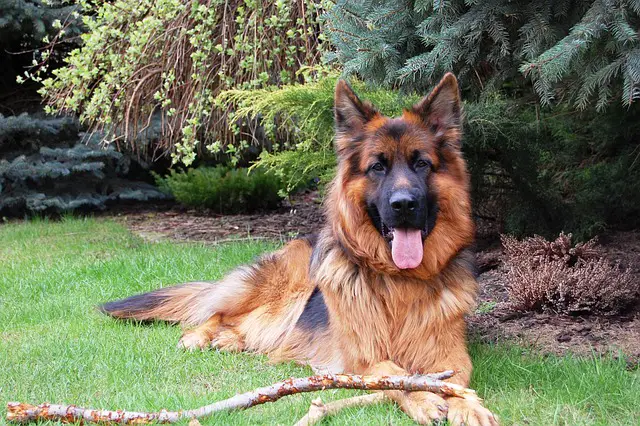
Kefir is also rich in skin-nourishing vitamins that help maintain good skin and fur. It can help your dog achieve a good and shiny coat without using any fur-conditioning dog shampoo and conditioner.
The effects of kefir on the skin would be so beneficial for dogs to rapidly recover from skin problems that caused them to have damaged skin and bald patches.
#8 Alleviates upset stomach

If you are wondering why your dog loves munching on your plants or grass, they are probably looking for a way to relieve an upset stomach or satisfy a nutritional hunger. Kefir contains both nutrients and proteins that can help satisfy your dog’s nutritional needs and probiotics that can fight off pathogens that cause problems in their gut.
Note: Before giving your pet kefir, make sure that they are not lactose-intolerant because it may do more harm than good. If you’re clueless if it is lactose-intolerant, it’s best to not feed it with kefir and consult your vet first.
#9 Reduce the risk of recurring urinary tract infection

Urinary tract infection (UTI) is a common but toughest condition to treat in dogs. Like humans, antibiotic resistance is also prevalent in dogs which leads to recurring UTIs. With that, the University of California pioneered research on how to mitigate the recurring UTI problem in dogs using other methods than antibiotics.
Usually, the bacteria from the skin and large intestine are the main causes of UTIs in dogs. Researchers found that since kefir probiotics are efficient in treating skin conditions, they might also be a good treatment for UTIs in dogs and finally prevent re-infection.
#10 Helps fight off yeast infections
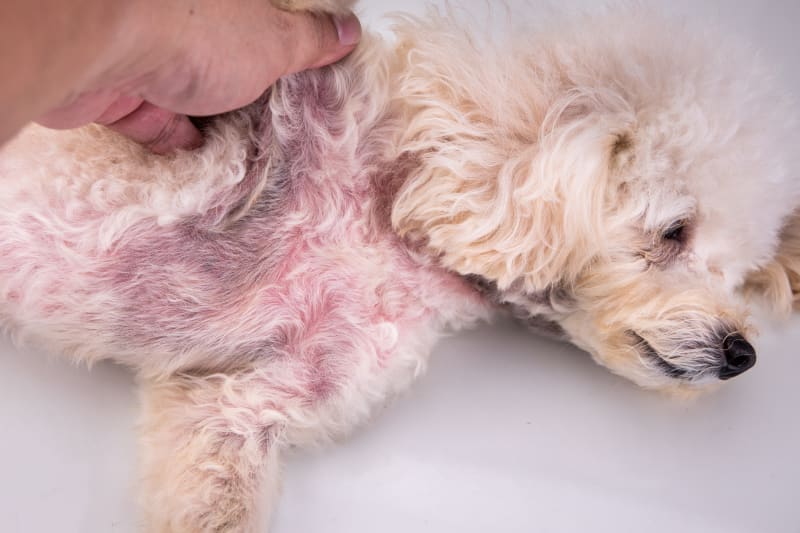
Kefir is made of milk and a colony of yeast and good bacteria. Though it also contains yeast, the strains it possesses are different from the yeast problems found in dogs. Kefir is one of the natural remedies suggested by experts in treating yeast infections in dogs. It contains powerful strains of probiotics that can fight off the overgrowth of bacterial infection and naturally heal your dog.
How much kefir should you give to your dog?
Dogs don’t need too much kefir to reap its benefits. The daily recommended intake of kefir for dogs depends on their size:
- Small dogs: 1 teaspoon to 1 tablespoon.
- Medium-sized dogs: 1 to 2 tablespoons.
- Large dogs: 2 to 3 tablespoons.
Note: Beware of fruit-flavored yogurts and kefir which contain fruit extracts that are not allowed for your dog’s diet.
How to use kefir to alleviate your dog’s upset stomach
When your dog is feeling under the weather and start behaving like something is wrong, you may start giving it will small doses of kefir. Here’s how:
- Start giving your dog ¼ to ½ teaspoon of kefir to see how they will handle it.
- If there are no adverse reactions, you may increase their kefir intake based on their size. (Please refer to the recommended daily intake above). Add it to their food or drink throughout the day.
- If your dog still shows signs of distress, bring it to the vet. If it’s prescribed with antibiotics, ask the vet if you can continue giving kefir to your pet because some medications may react to the lactose in milk.
- In case kefir milk is not allowed, you may try giving your dog lactose-free kefir like water kefir.
Frequently Asked Questions (FAQs)
Can kefir give my dog diarrhea?
Yes, your dog may experience diarrhea if you give it too much kefir or it has lactose-intolerance. However, if your dog is perfectly healthy, they will benefit a lot from drinking kefir.
Is kefir or Greek yogurt better for dogs?
Kefir and yogurt are both good probiotics for dogs. As long as they are well=prepared and does not contain any chemical additives, they will keep your dog healthy and more resistant to dog illnesses.
Is kefir good for itchy dogs?
Kefir has a positive effect on dog’s skin. It contains yeast that fights off microscopic yeast that causes iitchy skin on your pet. It can also help alleviate its allergies and skin-derived urinary tract infection (UTI).
Can I give my dog kefir everyday?
Yes! You can add kefir to their meals or drink every day. Just make sure to keep it at a minimum. The daily recommended intake of kefir for dogs are:
- Small dogs: 1 teaspoon to 1 tablespoon.
- Medium-sized dogs: 1 to 2 tablespoons.
- Large dogs: 2 to 3 tablespoons.
